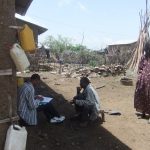This paper investigates the effect of devolved irrigation water management systems and complementary irrigation technologies on collective empowerment in Ethiopia. We find that households’ monetary, in-kind and labour contributions for irrigation water provision and appropriation are more common in farmer-managed gravity irrigation schemes compared with farmer-managed pump systems and jointly managed schemes. The most frequent conflict occurrence was observed in jointly managed gravity irrigation systems, followed by farmer-managed gravity systems. Our results indicate that irrigation users’ degree of participation, decision-making capacity and strength of local governance are also affected by several household, plot, village, scheme and climatic factors. Read more.
